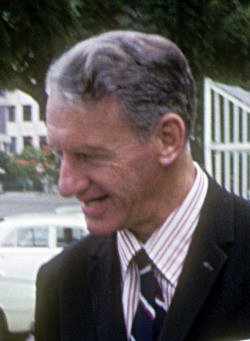Ian Smith
- name
- Family Name
- Given Name
- Birth Date
- Death Date
- Nationality
- Job Title
- Is Referenced By
- Description
- isRelatedTo
-
Ian Smith
-
Smith
-
Ian
-
1919
-
2007
-
Zimbabwean/Rhodesian
-
Prime Minister of Southern Rhodesia
-
Ian Douglas Smith (8 April 1919 – 20 November 2007) was a Rhodesian politician, farmer, and fighter pilot who served as Prime Minister of Rhodesia (known as Southern Rhodesia until October 1964 and now known as Zimbabwe) from 1964 to 1979. He was the country's first leader to be born and raised in Rhodesia, and led the predominantly white government that unilaterally declared independence from the United Kingdom in November 1965 in opposition to the UK's demands for the implementation of majority rule as a condition for independence. His 15 years in power were defined by the country's international isolation and involvement in the Rhodesian Bush War, which pitted Rhodesia's armed forces against the Soviet- and Chinese-funded military wings of the Zimbabwe African National Union (ZANU) and Zimbabwe African People's Union (ZAPU). Smith was born to British immigrants in the small town of Selukwe in the Southern Rhodesian Midlands, four years before the colony became self-governing in 1923. During the Second World War, he served as a Royal Air Force fighter pilot. A crash in Egypt caused debilitating facial and bodily wounds that remained conspicuous for the rest of his life. Following recovery, he served in Europe, where he was shot down and subsequently fought alongside Italian partisans. After the war, he established a farm in his hometown in 1948 and became a Member of Parliament for Selukwe that same year. Originally a member of the Liberal Party, he defected to the United Federal Party in 1953, and served as Chief Whip from 1958 onwards. He left that party in 1961 in protest over the territory's new constitution, and went on to co-found the Rhodesian Front the following year. Smith became Deputy Prime Minister following the Front's December 1962 election victory, and he stepped up to the premiership after Field resigned in April 1964, two months before the first events that led to the Bush War took place. After repeated talks with British Prime Minister Harold Wilson broke down, Smith and his Cabinet unilaterally declared independence on 11 November 1965 in an effort to delay majority rule; shortly afterwards, the first phase of the war began in earnest. After further negotiations with the UK failed, Rhodesia cut all remaining British ties and reconstituted itself as a republic in 1970. Smith led the Front to four election victories over the course of his premiership; despite sporadic negotiations with moderate leader Abel Muzorawa over the course of the war, his support came exclusively from the white minority, with the black majority being widely disenfranchised under the country's electoral system. The country initially endured United Nations sanctions and international isolation with the assistance of South Africa and, until 1974, the Portuguese colonies of Angola and Mozambique. Following 15 years of protracted fighting, with economic sanctions, international pressure and the decline in South African support taking their toll, Smith conceded to the implementation of majority rule and signed the Internal Settlement in 1978 with moderate leaders, excluding ZANU and ZAPU; the country was renamed Zimbabwe Rhodesia the following year. The new order, however, failed to gain international recognition, and the war continued. After being succeeded as Prime Minister by Muzorawa, Smith took part in the trilateral peace negotiations at Lancaster House, which led to fully free elections and the recognition of an independent Zimbabwe. Following the election, Smith served as Leader of the Opposition for seven years and marked himself as a strident critic of Robert Mugabe's government. His criticisms persisted after his 1987 retirement: He dedicated much of his 1997 memoir, The Great Betrayal, to condemning Mugabe, UK politicians, and defending his premiership. In 2005, Smith moved to South Africa for medical treatment, where he died two years later at the age of 88. As the dominant political figure and public face of Rhodesia in its final decades, Smith remains a divisive and controversial political figure to this day. By his supporters, he has been hailed as "a political visionary ... who understood the uncomfortable truths of Africa", defending his rule as one of stability and a stalwart against communism. His critics, in turn, have condemned him as "an unrepentant racist ... who brought untold suffering to millions of Zimbabweans" as the leader of a white supremacist government responsible for disempowering and discriminating against the black majority. (Wikipedia)
Linked resources
1–1 of 1
| Title | Class |
|---|---|
| Enwogion | CreativeWork |
